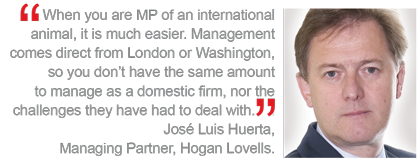Trials and triumphs – Hogan Lovells
For José Luis Huerta, Managing Partner of Hogan Lovells in Madrid and also Head of its Dispute Resolution Department, trials are his passion. “You need to feel passion for your profession,” he says, “otherwise it’s a very tough profession to be in”.
Huerta has been with Hogan Lovells in Madrid ever since it began life as Lovells in 2004. Subsequently, he has survived the trials of building up a business, and adjusting to a merger and the ongoing crisis.
He is especially proud of the triumph of going from an ‘unknown’ in the Spanish market, to cementing a place on its legal map, something that without a doubt, say competitors, was largely due to the merger with US firm Hogan & Hartson in 2010. Huerta agrees but with a caveat “Lovells was already an established name in Spain before the merger, but of course the merger gave us worldwide exposure that we wouldn’t otherwise have had – it’s logical!”
Opening statement
Having studied law in Oviedo, Huerta took an LLM at Queen Mary’s College University of London. After which he returned to Madrid and began his commercial litigation career at Estudio Legal, a domestic firm that started life as Garrigues’s biggest spin off back in 1975.
Estudio Legal then merged with PwC in 2000, and Huerta moved into the building opposite Hogan Lovell’s current offices. “So I’ve come full circle in a way!”And it was a great experience to have been part of a traditional law firm and then to move to a huge organisation like PwC, he says. “My view is that traditional domestic law firms have learnt a lot from these companies in terms of organisation and strategy.”
After four years at PwC, Huerta was looking for a change. José M Balañá, former Head of Corporate at Cuatrecasas, Gonçalves Pereira, was just setting up the Madrid office of UK-based Lovells and they discussed the project at length. And while it was a risky move going into unknown territory, he says, it was the excitement of starting a business that really grabbed his attention. So in 2004, Lovells Madrid was born, with Balañá and Huerta at the helm.
Opening remarks
Lovells began life in Madrid with just the two Partners and six fee-earners. It was tough, he says, as no one had any idea who they were. “The firm was establishing itself in Europe, but it wasn’t known in the same way as Freshfields or Linklaters.”
And it took some time, he admits. “When we spoke to people and said what we were doing, they would ask: ‘How many are you?’ And you say eight. ‘Well let me think about’– it was the standard response. They were unsure of whether we were going to stay for the long-term or just have a short-term adventure.”
For the same reasons, persuading people to join was the biggest challenge. And they were recruiting partners, lawyers and support staff, while at the same time trying to build a reputation that would entice them. “And also actually doing some chargeable work!”says Huerta. “But the good thing is that when someone is prepared to join in those circumstances you are talking about people prepared to endure and commit, and they had a sense of being involved in building the foundations of the firm.”
The case for merging
The 2010 merger with US-based Hogan & Hartson was something of a turning point for the firm, although the impact was felt much more at the London headquarters than in Madrid, says Huerta.
“We felt everything from a distance, because while Hogan & Hartson already had a presence in London, there was no office in Madrid,” he explains. “For us it felt like an opportunity to increase the flow of work from the US and a way to establish ourselves in the US and European market.”
In terms of aligning cultures, Huerta said that, curiously, they feel a greater affinity with the US office even though they are closer geographically to where their CEO and Regional Managing Partner of Continental Europe are based.
The Madrid office is now feeling the benefits of the merger and while it is still early days, says Huerta, so far so good. “It took some time for the referral work to start coming in, as people were figuring out what the Madrid office could offer.” But now they count on a stream of work, especially from the Miami and Washington offices.
And being part of a global network that is a way of ensuring that your rates remain at ‘international’ levels, something he says is a huge advantage given how tough competition is in the domestic legal market.
Hogan Lovells has also recently opened an office in Rio de Janeiro, Brazil, and Huerta believes there will be new opportunities for referral work in Latin America. Indeed, Graciela Llaneza, a Madrid Partner, has recently been appointed as Co-Chair of the firms’ Global Latin American Practice Group, which has proved very valuable in cementing ties.
“From a litigation or arbitration perspective, there are a great deal of opportunities in the region, as the norm is that the language for an arbitration is Spanish, although it may be based in Miami or New York,” he says. “And we are talking big projects, and this is where we can be very competitive. Because if you go to find a US lawyer to deal with a LatAm case, it’s going to be much more expensive – which gives us an advantage.”
Madrid’s evidence
The Madrid office now has 17 Partners and 70 lawyers, and last year saw growth of 8.9 percent, with a turnover of €20m.
Recent deals include advising Brookfield Infrastructure on its US$2.7bn joint acquisition, together with Abertis, of a 60 percent stake in OHL Brazil, one of the country’s major toll road operators, and the firm is currently representing the Republic of Chile before the Spanish Court in proceedings for the enforcement of an ICSID award in Spain.
One feature of the Madrid office that Huerta highlights is that they have never relied heavily on one area – although they have had discussions in the past, for example, about whether to have a stronger corporate team.
“If you go to Freshfields, Clifford Chance or the big domestic law firms, they have these strong clear teams, and people ask, ‘what about ours?,” he says – a sentiment that has been echoed by competitors.
But as Huerta counters, it has turned out to be a good idea not to rely too much on one area given how the crisis has evolved. ”We’ve been growing every year and finished the semester at 10 percent over budget, so we must be doing something right!”
The judge
Three years ago, Huerta took over the Managing Partner role from Balañá, who had held that role for six years and wanted to return to client work. “Change in this role is a very good thing,” says Huerta, “it brings a breath of fresh air and new ideas – and dealing with lawyers is a very difficult and tiring task! Lawyers are clever people, they know what to do”, he says, “and you have to be there when things go wrong, for whatever reason. So I take a ‘you’ve got me if you need me’ approach.”
But while the past three years have not been the easiest, Huerta admits that, during the crisis, it has been an advantage to be the MP of an office of an international firm rather than a domestic one. “When you are MP of an international animal, it is much easier. Management comes direct from London or Washington, so you don’t have the same amount to manage as a domestic firm, nor the challenges they have had to deal with.”
Huerta says this has always enabled him to strike a good management and work balance. “I still do a lot of commercial litigation work and absolutely love trials and arbitration. And being able to balance client work with being MP means that, when I do step down, it will be much easier coming back to fulltime client work.”
Closing arguments
The Madrid office has no specific plans for the year ahead, but they do need to grow, says Huerta. They recently re-launched their regulatory department with the hiring of Santiago Garrido from Garrigues, and Huerta says that white collar crime is hot area at the moment.
“And while all Spanish domestic law firms have big white collar teams, the international ones with a London base have been more reluctant” he explains. “Since white collar crime is huge in the US, and fully understood by our US counterparts at Hogans, this is something we can now really push for.”
The firm will be moving to bigger premises in the Spring of 2014, something that Huerta says is a sign, considering the climate, that clearly reflects firm’s commitment to the Madrid office. “
As for his term as MP, the duration is not set in stone. But there will be a change sooner rather than later, he hints, which will provide the opportunity for someone to step up and inject some new energy into the role.
But more importantly it will give him the chance to spend more time in his favourite place – the courtroom!












